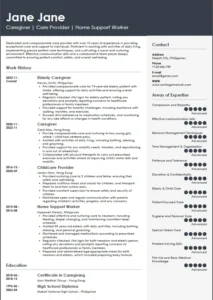Best Opportunities for Caregivers: Canada vs USA

- Introduction: Canada vs USA Caregiving
- Canada Caregiver Program: Overview and Eligibility Requirements
- USA Caregiver Program: Overview and Eligibility Requirements
- Pros and Cons of Being a Caregiver in Canada
- Pros and Cons of Being a Caregiver in the USA
- Comparing Benefits and Opportunities in Canada and the USA
- Agencies Hiring Foreign Caregivers in Canada
- Agencies Hiring Foreign Caregivers in United States
- Conclusion: Which Country Offers the Best Opportunities for Caregivers?
- Canada Resume for Caregivers
- Frequently Asked Questions (FAQs)
Introduction: Canada vs USA Caregiving
This post may contain affiliate links, meaning I may earn a commission if you make a purchase, at no extra cost to you. I only recommend products I trust. Thank you for your support.
Caregiving is a rewarding career that involves providing essential support and assistance to individuals who are unable to care for themselves. It requires compassion, patience, and a genuine desire to make a positive difference in someone’s life.

For those considering a career in caregiving, it is important to understand the opportunities available in different countries. This article will compare the caregiver programs in Canada vs USA, exploring their eligibility requirements, pros and cons, benefits, and opportunities for permanent residence.
By the end, you will have a comprehensive understanding of what is the best country to work as caregiver.
Canada Caregiver Program: Overview and Eligibility Requirements
The Canada Caregiver Program offers foreign caregivers the opportunity to work and potentially become permanent residents in Canada. This program consists of two pilot programs; Home child care Provider Pilot and Home Support Worker Pilot.
The Home Child Care Provider Pilot and Home Support Worker Pilot are 5 years Pilot Programs designed for skilled caregivers and their families to embark on a journey to Canada with the ultimate aim of attaining permanent residency allowing them to contribute to the Canadian workforce and society.
If you’ve received a job offer in Canada as a caregiver or possess relevant work experience in these fields, you might be eligible to apply for permanent residence through one of these specialized immigration pathways.
Now, only 12 months of experience are required instead of the previous 24 months for qualification to apply in the direct to permanent resident category. Register and complete the record of employment form to qualify your work experience.
Home child care providers assist parents with the care of their children in addition to potentially contributing to household tasks.

Crucially, caregivers in this program must provide only child care services in their homes or in the private residences of their employers – a key requirement. Residency in your employer’s home is not a prerequisite for eligibility.
Please be aware that the work setting for this position excludes institutional environments like daycare centers. Additionally, previous experience as a foster parent will not be considered as a qualifying factor for this role.
Occupations covered by this pilot program span a range of child care roles, encompassing:
- Babysitter
- Child care live-in caregiver
- Child care provider – private home
- Nanny
- Parent’s helper
Also included are:
- Babysitter – fitness centre
- Babysitter – shopping centre
- Foster parent
To be eligible for the Home Child Care Provider Pilot Program, applicants or candidates must meet certain requirements:
- Education:
- Applicants must have completed the equivalent of a Canadian secondary (high school) education or a minimum of 72 units at college or university.
- Home child care providers, parent’s helpers and foster parents may require completion of a training program in child care or a related field.
- Child care or household management experience may be required.
- First aid certification and cardiopulmonary resuscitation (CPR) training may be required.
- Qualifying Work Experience:
- Candidates must have at least 12 months of full-time work experience in a related field, such as child care.
- Language Proficiency:
- Proficiency in English or French is required to communicate effectively with the individuals under their care. Candidates must demonstrate language proficiency by taking an approved language test.
- The minimum language level required varies depending on the occupation. Check and assess your proficiency in Canadian Language Benchmarks (CLB) for English and Niveaux de compétence linguistique canadien (NCLC) for French.
- A minimum language proficiency of CLB 5 in English or NCLC 5 in French is required for proficiency in all four language skills: speaking, listening, reading, and writing.
- Job Offer:
- Not a requirement but if you have a job offer, it should be a valid and genuine job offer from a Canadian employer. The job offer must be full-time employment, and you should plan to live outside the province of Quebec
- Admissibility:
- Candidates must be admissible to Canada, which includes passing security, criminal, and medical checks.
Home Support Workers or caregivers offer personal care and companionship to seniors, individuals with disabilities, and convalescent clients.

Their services are delivered within the client’s residence, and in some cases, they may also reside there. Employment opportunities exist within home care and support agencies, private households, or individuals may choose to work independently.
Check out the 6 Powerful Tips for Crafting a Caregiver Resume
Occupations covered by this pilot program span a range of caregiving roles, encompassing:
- Attendant for persons with disabilities – home care
- Family caregiver
- Home support worker
- Live in caregiver – seniors
- Personal aide – home support
- Personal care attendant – home care
- Respite worker – home support
Also included is:
- Doula
To be eligible for the Home Support Worker Pilot Program, applicants or candidates must meet certain requirements:
- Education:
- Applicants must have completed the equivalent of a Canadian secondary (high school) education or a minimum of 72 units at college or university.
- College or other courses in home support may be required.
- First aid certification may be required.
- Completion of a training program in care of the elderly, care of persons with disabilities, convalescent care or in a related field may be required.
- Qualifying Work Experience:
- Candidates must have at least 12 months of full-time work experience in a related field, such as elderly care or individuals with disabilities.
- Language Proficiency:
- Proficiency in English or French is required to communicate effectively with the individuals under their care. Candidates must demonstrate language proficiency by taking an approved language test.
- The minimum language level required varies depending on the occupation. Check and assess your proficiency in Canadian Language Benchmarks (CLB) for English and Niveaux de compétence linguistique canadien (NCLC) for French.
- A minimum language proficiency of CLB 5 in English or NCLC 5 in French is required for proficiency in all four language skills: speaking, listening, reading, and writing.
- Job Offer:
- Not a requirement but if you have a job offer, it should be a valid and genuine job offer from a Canadian employer or agent. The job offer must be full-time employment, and you should plan to live outside the province of Quebec.
- Admissibility:
- Candidates must be admissible to Canada, which includes passing security, criminal, and medical checks.
USA Caregiver Program: Overview and Eligibility Requirements
In the USA, the caregiver program is known as the Live-in Caregiver Program.
To be eligible for this program, applicants or candidates must meet the following requirements:
- Training: Applicants must complete a training program approved by the state in which they intend to work.
- Work Experience: Candidates are typically required to have prior experience in caregiving or related fields. The exact amount of required experience may vary.
- Certification: Candidates must obtain certification as a Home Health Aide through a recognized institution.
- Background Check: A comprehensive background check, including criminal and employment history, is required to ensure the safety of the individuals being cared for.
- Language Proficiency: Proficiency in English is essential to effectively communicate with clients and medical professionals.
- Legal Authorization to Work: Applicants must have legal authorization to work in the United States. This may include having a valid visa or employment authorization document.
- Job Placement: Applicants may need to secure a job offer from a US employer or an agency that requires live-in caregiving services.
These requirements ensure that caregivers in the USA are qualified and capable of providing the necessary care and support to those in need.
Pros and Cons of Being a Caregiver in Canada
Being a live-in caregiver in Canada offers several advantages, such as:
- Opportunity for Permanent Residence: After completing the required work experience, caregivers have the opportunity to apply for permanent residence through various immigration programs.
- Access to Essential Services: Caregivers have access to essential services such as healthcare, education, and social support systems.
- Fair Labor Laws: Canada has strict labor laws that protect the rights of caregivers, ensuring fair wages, working conditions, and benefits.
However, there are also some challenges, including:
- Isolation: Caregivers may experience feelings of isolation due to their live-in arrangement and the demands of their job as a result of being away from family and friends.
- Cultural Adjustment: Adjusting to a new country, culture, and language can be challenging for caregivers.
- Limited Career Growth: The caregiving profession may not offer significant career growth opportunities beyond being a caregiver.
Caregivers must carefully weigh these pros and cons before deciding to pursue a career in Canada.
Pros and Cons of Being a Caregiver in the USA
Being a live-in caregiver in the USA also comes with its own set of advantages, such as:
- Vast Job Opportunities: The USA has a high demand for caregivers, providing ample caregiver jobs and health care opportunities.
- Competitive Compensation: Caregivers in the USA generally receive competitive wages and benefits.
- Career Advancement: There are opportunities for career advancement in the caregiving field, such as becoming a registered nurse or pursuing higher education.
However, there are challenges as well, including:
- Uncertain Immigration Path: Unlike Canada, the USA does not have a direct pathway to permanent residency for caregivers.
- Varied Labor Laws: Labor laws and regulations may vary from state to state, impacting wages, working conditions, and benefits.
- Lack of Support Services: Caregivers in the USA may face challenges accessing affordable healthcare, education, and social services.
Caregivers must consider these pros and cons before deciding to pursue a career in the USA.
Comparing Benefits and Opportunities in Canada and the USA
When comparing the benefits and opportunities for live-in caregivers in Canada and the USA, several factors come into play.
In Canada, caregivers have access to healthcare benefits, social services, and competitive wages. They also have the opportunity to apply for permanent residence through caregiver-specific immigration programs.
In contrast, caregivers in the USA can expect higher wages and opportunities for career growth. However, they may face challenges with the complex immigration system and limited access to certain social services.
Ultimately, the best country for live-in caregivers depends on individual preferences, career goals, and personal circumstances.
Agencies Hiring Foreign Caregivers in Canada
- Overview: Paramed Home Health Care is a trusted home care agency in Canada, dedicated to providing high-quality and compassionate care services. Their team of caregivers focuses on creating a supportive and nurturing environment, tailoring care plans to address the specific needs of each client.
- Services: Personal care assistance, companionship, medication management, and support with daily living activities.
- Overview: Bayshore Home Health is a leading home care agency in Canada, recognized for its commitment to providing high-quality care services. With a focus on promoting independence and improving the overall well-being of clients, they offer personalized care plans delivered by skilled and compassionate caregivers.
- Services: Personal care assistance, companionship, medication management, and support with daily living activities.
- Overview: Closing the Gap Healthcare is a trusted home care agency in Canada, known for its dedication to enhancing the health and well-being of clients. Their team of caregivers prioritizes creating customized care plans that address specific needs, fostering a sense of independence and dignity.
- Services: Personal care assistance, companionship, medication reminders, and assistance with daily living activities.
- Overview: VHA Home HealthCare is a well-established home care agency in Canada, recognized for its commitment to delivering compassionate and client-centered care. Their team of highly trained caregivers focuses on building trusting relationships and tailoring care plans to meet the unique needs of each individual.
- Services: Personal care assistance, companionship, medication management, and assistance with light household tasks.
- Nurse Next Door:
- Overview: Nurse Next Door is a prominent home care agency in Canada, known for its unique approach to care, characterized by compassion and innovation. Their caregivers aim to make a positive impact on the lives of clients by providing personalized care and fostering a sense of companionship.
- Services: Personal care assistance, companionship, meal preparation, medication reminders, and assistance with daily living activities.
Agencies Hiring Foreign Caregivers in United States
- Overview: With a team of highly trained caregivers, Synergy Home Care is rated as the best home care agency which focuses on promoting independence and enhancing the quality of life for their clients. They prioritize building trusting relationships and creating customized care plans tailored to each individual’s needs.
- Services: Personal care assistance, companionship, transportation, medication reminders, and housekeeping.
- Overview: In the second position is Preferred homecare. This is a reputable care agency committed to providing exceptional care to individuals of all ages. They offer a comprehensive range of services designed to meet the unique needs of each client.
- Services: Personal care, medication management, meal preparation, transportation, and companionship.
- Overview: This is a reputable care agency dedicated to providing top-quality care to individuals of all ages. They offer personalized care plans designed to meet the unique needs of each client by emphasizing the importance of holistic care and focuses on promoting physical, emotional, and mental well-being. Their team of compassionate caregivers is committed to providing exceptional care and companionship to their clients.
- Services: Personal care assistance, medication management, meal preparation, transportation, housekeeping and companionship.
- Griswold Home Care
- Overview: Griswold Home Care is a trusted care agency known for its dedication to providing compassionate care to individuals in need. They offer a range of services designed to support clients in maintaining their independence and enhancing their quality of life. They understand the importance of preserving dignity and promoting well-being.
- Services: Personal care, companionship, medication management, transportation, and help with daily activities.
Conclusion: Which Country Offers the Best Opportunities for Caregivers?
In conclusion, both Canada and the USA offer valuable opportunities for live-in caregivers.
Canada provides access to healthcare benefits, social services, and caregiver-specific immigration programs. The USA offers higher wages, career growth opportunities, and a chance to work in a diverse and dynamic environment.
Ultimately, the best country for live-in caregivers depends on individual preferences, career goals, and personal circumstances.
It is essential for caregivers to carefully consider their options, weigh the pros and cons, and make an informed decision that aligns with their aspirations and priorities.
Canada Resume for Caregivers
Start building a standout Canadian caregiver resume that highlights your skills and experiences effectively. Your success in the job market begins with a professionally tailored resume!

Do you need help with Canada or Europass Resume? Contact me on messenger or send me message here
Frequently Asked Questions (FAQs)
What is the average caregiver salary in Canada?
The average caregiver salary in Canada varies depending on factors such as experience, location, and specific job responsibilities. On average, caregivers in Canada can earn between CA $15 to CA $25 per hour.
What is the average caregiver salary in the United States?
The average salary for caregivers in the United States can range from $15 to $30 per hour, depending on factors such as experience, location, and the type of caregiving services provided.
What training and certifications are required to become a caregiver?
The requirements for caregiver training and certifications can vary by location and employer. In general, caregivers may need basic first aid and CPR certification, and some employers may require additional training in areas such as dementia care or specialized healthcare.
What benefits do caregivers receive in the United States?
Caregiver benefits in the United States can vary by employer. Some caregivers may receive health insurance, paid time off, and retirement benefits. The specific benefits depend on the employer’s policies and the terms of employment.
What are the visa requirements for caregivers in Canada?
The visa requirements for caregivers in Canada depend on the specific caregiver program. Caregivers may need to obtain a work permit and meet certain qualifications, such as education and work experience.




